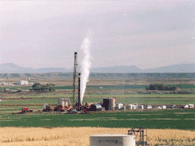From the Council’s Rural Life Committee:
We are disturbed by increasing reports of NC landowners who are signing over some of their property rights to energy companies looking for new sources of natural gas. In addition to the environmental damage caused by accessing this natural gas, we are concerned that in many cases landowners are not fully aware of their rights and how these contracts will impact the use of their land in the future.
The following information comes from our friends at Rural Advancement Foundation International.
Visit this page for more complete information.
If you are a farmer or landowner in Lee, Chatham, or Moore Counties in North Carolina, you may be approached by companies interested in leasing your mineral rights and tapping potential natural gas deposits beneath your land. (1)
Always seek legal advice before signing these contracts. Mineral rights leases are binding legal contracts that may have unexpected impacts for you and your family. RAFI has been working with NC State University and other legal experts to analyze the contracts being offered in our state, and we have serious concerns about potential liability and other impacts on farmers and landowners.
Hydraulic fracturing, shale and North Carolina
Natural gas is found in between layers of shale, sandstone or limestone.(2) Natural gas has been found in a shale formation that runs under central North Carolina under the Deep River Basin.(3)
Gas in this kind of rock formation is normally mined through horizontal drilling and hydraulic fracturing, also known as fracking.(4) In hydraulic fracturing, a drill shaft goes down into the layer of gas-bearing shale, then turns and runs horizontally. Water and chemicals are pumped at high pressure into the rock, causing it to break apart and release the gas that is trapped in tiny pockets in the shale.(5) Horizontal drilling and hydraulic fracturing are not currently permitted under North Carolina law.(6)
Protecting your property rights
Gas leases can contain legal language that allows companies to:
- Build roads, buildings, gates, drilling stations and pipelines on any spot on your land;
- Bill you for all of their expenses if at any time they find a problem with your title;
- Leave you liable for any damages caused to neighboring landowners by their drilling practices;
- Interfere with farming, hunting, timber rights, conservation programs, and other uses of your land;
- Use millions of gallons of water from your well;
- Store waste water and chemicals on your land.
Always talk to a lawyer before you sign one of these contracts. RAFI can help you find affordable legal representation. Contact Jordan Treakle at jordan@rafiusa.org or (919) 444-1321 for more information.
1) Talk to a lawyer. Gas leases are usually written to benefit the company, not the landowner, and can be difficult to understand.(7) Do not sign a contract without consulting a lawyer with experience in oil and gas leasing. For help finding legal representation, contact RAFI.
Leases don’t just grant the rights to the minerals under your land. They can give the leasor the right to explore, drill, build, and travel across your land, and they can have major financial and practical impacts on your farm and your family.(8) Always get agreements in writing. Leases are legal documents, and take precedence over any verbal agreement you might have with a company.(9)
2) Take time to explore your options. Mineral rights leases are binding legal contracts. Even if you sell your property, the buyer must accept the lease along with the land.(10) Leases often contain language saying that they will extend as long as gas can be extracted from the land.(11) You have time to consider any offer, to consult an attorney, and to negotiate if you decide to go forward.
The kinds of drilling that are normally used to extract these types of gas deposits are currently illegal in this state. According to Ted Feitshans at NC State Cooperative Extension, this means that North Carolina landowners are being offered abnormally low prices for their land. Most leases in North Carolina offer $3 – $4 an acre. In New York and Pennsylvania, landowners are leasing for $2,500 – $3,000 an acre.(12)
Click here to continue reading.

